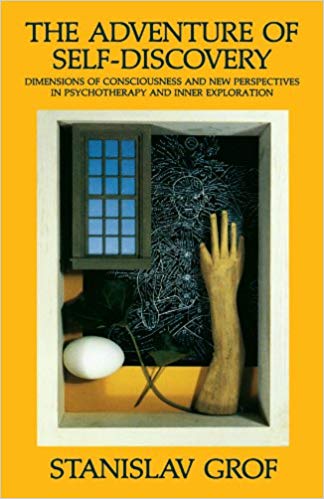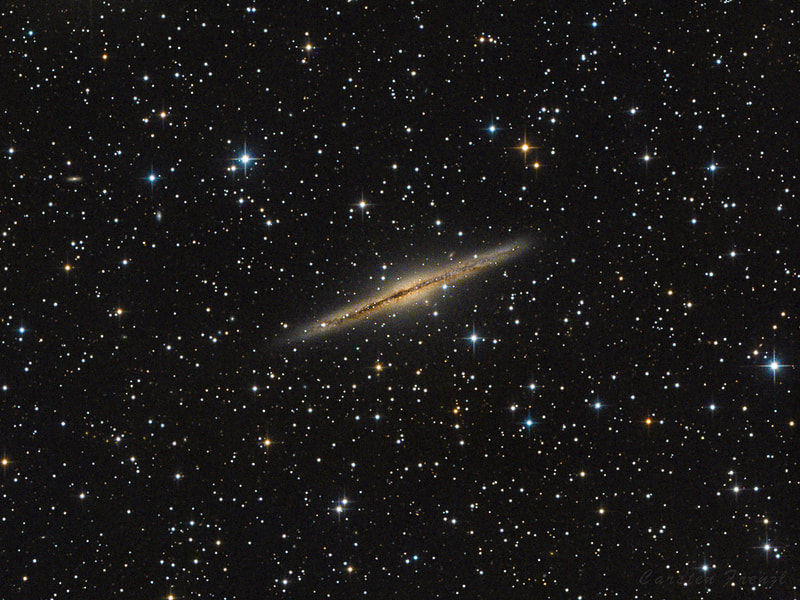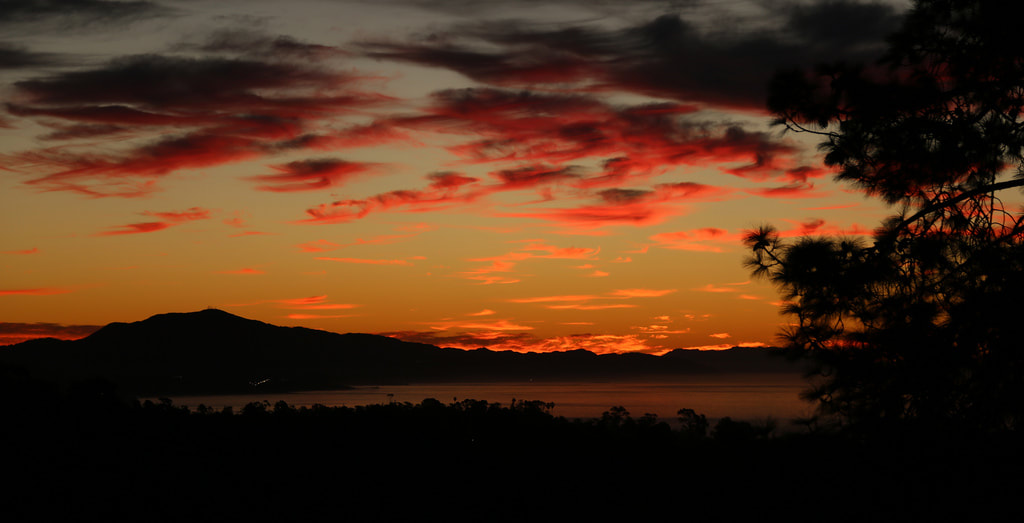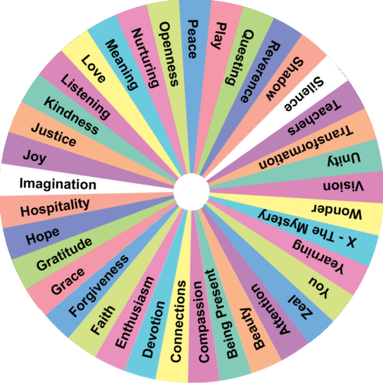Whitehead and the Transpersonal Mind
informal notes for a forthcoming conference
by Jay McDaniel, in appreciation of the work of John Buchanan
|
In Whitehead's philosophy the human mind is more -- much more -- than ordinary waking consciousness as guided by the senses. It carries within it universes within universes, many of them unconscious. These universes are within it, to be sure, but also beyond it. They have reality in their own right, and one of the geniuses of Whitehead's philosophy is that it offers a view of a multidimensional universe which can be revealed within a multidimensional mind.
Some of these universes are actual; they are the many worlds of "the past actual world" extending back to the very origins of the universe, or before. Some of these universes are potential; they are dimensions of reality Whitehead calls the realm of eternal objects, which itself contains potentialities both for objective spatio-temporal relations and potentialities for subjective feeling. Some are divine; they are dimensions within the ongoing life of God, who is, for Whitehead, the very Consciousness of the universe: that is, the Consciousness in whose life the other consciousnesses (lives) unfold. Some are a combination of the actual and the potential; a strange limbo-like land that partakes of what is and what can be at the same time, forming a strange hybrid between the actual and potential. Some are physically felt, some are conceptually felt, and some are imaginatively prehended. Some are conscious but most are unconscious. Some are beautiful, some are terrifying, and many are both. All are real. One of the attractions of his philosophy to people who are interested in consciousness studies or philosophies of mind is that it can help make sense of what we might call "exceptional experiences" -- experiences which make contact with these other worlds. Exceptional experiences are experiences which differ from ordinary waking consciousness and which can have a transforming effect. 50 Kinds of Exceptional Experiences In The Adventure of Self-Discovery: Dimensions of Consciousness and New Perspectives in Psychotherapy and Humanistic Psychology, Stanislav Grof identifies and describes many of these experiences, Culling from the table of contents of the book, I will list them, using, for the most part, his language: Experiences in the Womb (Pre-Natal)
|
Can Such Experiences Help Save the World?
On, then, to the question, can such experiences or at least some of them, help save the world? By "saving the world" I mean what process philosophers and theologians, influenced by Whitehead, mean. I mean helping to bring about communities in local settings that are creative, compassionate, participatory, egalitarian, ecologically wise, and spiritually satisfying, with no one left behind. I mean developing forms of international and interregional cooperation that help free humanity from its catastrophes in the making: overpopulation, overconsumption, war and violence, environmental collapse, and political repression. And I mean making space -- lots of space -- for wild creatures who deserve respect and care, and who are themselves beloved citizens on a small but gorgeous planet. This, of course, is a radical vision: see Wm. Andrew Schwartz: The Radical Vision of Ecological Civilization.
*
So can exceptional experiences help? The answer depends not only on their content but also on how they function in the life of the person who enjoys them. If the experiences help a person become more wise and compassionate, better able to live with respect and care for the community of life, they help. If not, they don't.
Even if they don't help, they may still be valuable as a means of personal transformation. The whole of life need not be devoted to saving the world, and the very activity of "saving the world" can easily lapse into a will-to-mastery. If you really want to save the world, the key, say the process theologians, is to cooperate with a creative and healing spirit that is within you yet more than you. The key is to live in partnership with the Soul of the universe who seeks individual well-being and collective well-being for life on earth. And it is to have some fun, some joy, along the way. "Exceptional experiences" can be included within the joy.
*
Let me back up. I am a baby-booming child of the sixties. I know a small bit about some of exceptional experiences recognized by Grof. I took LSD three times in those days, and in every instance I felt and experienced things that might be called exceptional by some, but seemed natural at the time. One was a moment of feeling the radical interconnectedness of all things amid the shining lights of West End Avenue in Nashville, Tennessee; one was a feeling of profound connection with a dog whose “mind” I somehow felt and knew in a very vivid way; and one was a sense of the sheer aliveness of snow on the ground on a wintry night. These were, for me, illuminating experiences – indeed, religious experiences. I think I really saw something. I think they were “true.”
When I studied Whitehead’s philosophy later, I recognized immediately that his thinking would likewise affirm such truths. It wasn’t dry metaphysics that drew me to Whitehead; it was his phenomenological cosmology. His cosmology spoke to my experience.
I also knew that not everyone benefitted from these experiences as did I, and that experiences under LSD could lead to tragedy. In the course of a single year, I had two friends – two! – who jumped out of windows to their death. One thought he could fly; the other was, I think, depressed. I saw the body of one lying on the ground and can never forget it. My generation was not mature enough to take LSD. We had no social structures in place, no rituals to orient us, no guides. All we had was free-spirited hippiedom. It was not enough.
I began at this time to look for other ways to grow in wisdom and compassion; and it was about this time that I became the English teacher for a Zen Buddhist priest (soon to become master) who had had the “enlightenment” experience. You can read about this in Can a Christian be a Buddhist, Too? From him I gained a sense that Buddhist enlightenment was different from the LSD experience, and perhaps in some ways much more important, because it carried with it a practice that is important in daily life, namely meditation, and because it does not draw a sharp divide between everyday life and spirituality. I became drawn to this Zen way of looking at things, and was intrigued by the fact that it did not emphasize extraordinary experiences, although quiet meditation in Zen style is extraordinary in its way as is the practice of receiving and trying to respond to koans. I was given a koan by my Japanese Zen Master, Roshi Keido Fukushima, and "solving" it my way, amid the absolute intensity of dokusan (the one on one interview) was quite illuminating.
All things considered, my experience in Zen has taught me that there is holy light everywhere -- in a cup of coffee, the face of a friend, a moment of joy, a moment of suffering – if only we have eyes to see. My LSD days seem long ago.
And yet I do think that the world would be a much better place if we did not cling so tightly to ordinary waking consciousness as the be-all-and-end-all of life. I am sympathetic to the many cultural traditions that believe in, and trust, exceptional experiences: indigenous, Islamic, Jewish, Christian, Hindu, and Buddhist. And I am likewise sympathetic to the argument, made by Seyyed Nasr, that belief in "other worlds" and in the possibility of "heavens" hereafter can make us less greedy when it comes to the things of this earth. With Nasr, I do think that clinging to the disclosures of ordinary waking consciousness is part of the problem with the world today. We might be kinder to others, and kinder to ourselves, if we knew that there is more to life than appearance, affluence, and marketable achievement: the three gods of consumer culture.
Thus I was drawn to a conference held in Claremont, California, this coming March called Can Exceptional Experience Help Save the World? The blurb for the conference read as follows:
This conference will explore applying the insights from process philosophy and transpersonal psychology to the issues we are facing today. How can we bring our understandings into the world to create a more sustainable, just, and humane civilization for future generations?...Our aim will be to explore how Whitehead’s metaphysics can be applied to connect insights from transpersonal psychology with fostering sustainable, ecological civilization. We see this as an opportunity to build strategic relationships and develop some mechanisms for the social change necessary for humanity to not only survive, but thrive. Some basic questions we plan to explore are: How can we best understand exceptional experience? How can we more fully integrate such experience into science and culture? How can exceptional experience be leveraged to address the global crisis?
A friend of mine, John Buchanan, is helping organize it. I liked the simplicity of the title – Can exceptional experience help save the world? – and I found myself saying: Yes, exceptional experience can help save the world in two ways: (1) by opening us to possibilities for empathic connections with the more than human world, thus fostering ecological consciousness and a sense of radical interconnectedness, of the sort I experienced with LSD, and (2) by empowering us to realize that, once basic needs are met, human fulfillment lies in feeling more rather than having more.
However, in order to function in this way exceptional experiences of the positive kind (those leading to wisdom and compassion) must be integrated into daily life, thereby contributing to what Frederic and Mary Ann Brussat call the spiritual alphabet or the alphabet of spiritual virtues. States of consciousness must become traits of consciousness. Flashes of insight must become abiding light in daily life. They must contribute to some of spiritual virtues identified below: love, listening, reverence, peace, hope, gratitude, forgiveness. Non-ordinary states of consciousness have their "cash value" (to quote William James) insofar as they help evoke these virtues of daily life and corporate experience.
*
So can exceptional experiences help? The answer depends not only on their content but also on how they function in the life of the person who enjoys them. If the experiences help a person become more wise and compassionate, better able to live with respect and care for the community of life, they help. If not, they don't.
Even if they don't help, they may still be valuable as a means of personal transformation. The whole of life need not be devoted to saving the world, and the very activity of "saving the world" can easily lapse into a will-to-mastery. If you really want to save the world, the key, say the process theologians, is to cooperate with a creative and healing spirit that is within you yet more than you. The key is to live in partnership with the Soul of the universe who seeks individual well-being and collective well-being for life on earth. And it is to have some fun, some joy, along the way. "Exceptional experiences" can be included within the joy.
*
Let me back up. I am a baby-booming child of the sixties. I know a small bit about some of exceptional experiences recognized by Grof. I took LSD three times in those days, and in every instance I felt and experienced things that might be called exceptional by some, but seemed natural at the time. One was a moment of feeling the radical interconnectedness of all things amid the shining lights of West End Avenue in Nashville, Tennessee; one was a feeling of profound connection with a dog whose “mind” I somehow felt and knew in a very vivid way; and one was a sense of the sheer aliveness of snow on the ground on a wintry night. These were, for me, illuminating experiences – indeed, religious experiences. I think I really saw something. I think they were “true.”
When I studied Whitehead’s philosophy later, I recognized immediately that his thinking would likewise affirm such truths. It wasn’t dry metaphysics that drew me to Whitehead; it was his phenomenological cosmology. His cosmology spoke to my experience.
I also knew that not everyone benefitted from these experiences as did I, and that experiences under LSD could lead to tragedy. In the course of a single year, I had two friends – two! – who jumped out of windows to their death. One thought he could fly; the other was, I think, depressed. I saw the body of one lying on the ground and can never forget it. My generation was not mature enough to take LSD. We had no social structures in place, no rituals to orient us, no guides. All we had was free-spirited hippiedom. It was not enough.
I began at this time to look for other ways to grow in wisdom and compassion; and it was about this time that I became the English teacher for a Zen Buddhist priest (soon to become master) who had had the “enlightenment” experience. You can read about this in Can a Christian be a Buddhist, Too? From him I gained a sense that Buddhist enlightenment was different from the LSD experience, and perhaps in some ways much more important, because it carried with it a practice that is important in daily life, namely meditation, and because it does not draw a sharp divide between everyday life and spirituality. I became drawn to this Zen way of looking at things, and was intrigued by the fact that it did not emphasize extraordinary experiences, although quiet meditation in Zen style is extraordinary in its way as is the practice of receiving and trying to respond to koans. I was given a koan by my Japanese Zen Master, Roshi Keido Fukushima, and "solving" it my way, amid the absolute intensity of dokusan (the one on one interview) was quite illuminating.
All things considered, my experience in Zen has taught me that there is holy light everywhere -- in a cup of coffee, the face of a friend, a moment of joy, a moment of suffering – if only we have eyes to see. My LSD days seem long ago.
And yet I do think that the world would be a much better place if we did not cling so tightly to ordinary waking consciousness as the be-all-and-end-all of life. I am sympathetic to the many cultural traditions that believe in, and trust, exceptional experiences: indigenous, Islamic, Jewish, Christian, Hindu, and Buddhist. And I am likewise sympathetic to the argument, made by Seyyed Nasr, that belief in "other worlds" and in the possibility of "heavens" hereafter can make us less greedy when it comes to the things of this earth. With Nasr, I do think that clinging to the disclosures of ordinary waking consciousness is part of the problem with the world today. We might be kinder to others, and kinder to ourselves, if we knew that there is more to life than appearance, affluence, and marketable achievement: the three gods of consumer culture.
Thus I was drawn to a conference held in Claremont, California, this coming March called Can Exceptional Experience Help Save the World? The blurb for the conference read as follows:
This conference will explore applying the insights from process philosophy and transpersonal psychology to the issues we are facing today. How can we bring our understandings into the world to create a more sustainable, just, and humane civilization for future generations?...Our aim will be to explore how Whitehead’s metaphysics can be applied to connect insights from transpersonal psychology with fostering sustainable, ecological civilization. We see this as an opportunity to build strategic relationships and develop some mechanisms for the social change necessary for humanity to not only survive, but thrive. Some basic questions we plan to explore are: How can we best understand exceptional experience? How can we more fully integrate such experience into science and culture? How can exceptional experience be leveraged to address the global crisis?
A friend of mine, John Buchanan, is helping organize it. I liked the simplicity of the title – Can exceptional experience help save the world? – and I found myself saying: Yes, exceptional experience can help save the world in two ways: (1) by opening us to possibilities for empathic connections with the more than human world, thus fostering ecological consciousness and a sense of radical interconnectedness, of the sort I experienced with LSD, and (2) by empowering us to realize that, once basic needs are met, human fulfillment lies in feeling more rather than having more.
However, in order to function in this way exceptional experiences of the positive kind (those leading to wisdom and compassion) must be integrated into daily life, thereby contributing to what Frederic and Mary Ann Brussat call the spiritual alphabet or the alphabet of spiritual virtues. States of consciousness must become traits of consciousness. Flashes of insight must become abiding light in daily life. They must contribute to some of spiritual virtues identified below: love, listening, reverence, peace, hope, gratitude, forgiveness. Non-ordinary states of consciousness have their "cash value" (to quote William James) insofar as they help evoke these virtues of daily life and corporate experience.
Which takes me, then, to how Whitehead might help. I see five ways.
Five Contributions from Whitehead
- Whitehead offers a Expansive View of Mind or Consciousness. As John Buchanon makes clear, Whitehead’s philosophy offers a cosmology that helps us understand and appreciate many kinds of experience that are “exceptional” given the conventional idea that ordinary waking consciousness is the only veridical form of experience. It can expand the idea of normal such that it includes, rather than excludes, what might otherwise be considered abnormal modes of consciousness.
- Whitehead makes sense of Empathy with Nature. He offers a cosmology which invites us to understand and appreciate the intrinsic value – the value in and for itself, the subjectivity – of the more than human creation.
- Whitehead opens the door for an appreciation of multiple forms of Mysticism: He invites us to consider and honor many kinds of mystical experience, with “mystical” understood as ultra-natural not supernatural: a mysticism of energy, mysticism of interconnectedness, mysticism of local community, mysticism of archetypes, mysticism of divine love, mysticism of the collective unconscious, mysticism of shamanic journeying, mysticism of daily life (mindfulness). See Eight Forms of Mysticism.
- Whitehead offers a way of thinking about God that can be joined with the exploration of altered states of consciousness, some of which may be experiences of God. He offers a way of thinking about God which is open to the idea that God lures us toward widened horizons of awareness and practices that are conducive to ecological civilizations. God is the cosmic mind of the universe, everywhere at once.
- Whitehead's philosophy points to the possibility and desirability of Ecological Civilizations. As developed by John Cobb, Philip Clayton, Andrew Schwartz and others, it points toward the kinds of communities that are “ecological” in the widest sense: just, sustainable, creative, participatory, kind to animals, reverential toward the earth, and spiritually satisfying, with no one left behind.
A Cosmology that Widens
Let me turn, then, back to the first of the six: the widened view of consciousness. By consciousness I mean what Whitehead meant by feeling, which, strictly speaking can be conscious or unconscious. I note three ways in which Whitehead's cosmology offers a widened view of the feeling mind.
With its idea that the universe unfolds within an extensive continuum, it invites us to recognize the possibility that there are dimensions of space beyond three dimensions which might be occupied by actualities quite different from plants and animals we see around us, but which may well have agency of their own. And it invites us to wonder if, perchance, these actualities might be prehended by us humans in non-ordinary states of consciousness: dreams and visions, for example. And it invites us to consider the possibility that some of these states of consciousness might be elicited by certain kinds of drugs, synthetic and organic.
With this its idea of unconscious prehensions of other, including hybrid, prehensions that transcend the need for contiguous causation, it invites us to wonder if we humans might on occasion experience and in some ways relive our own personal pasts, including our births, and do the same with other pasts not in our personal lineage, and if we might also feel the feelings of other human beings – and perhaps other animals, too – telepathically.
With its assertion that the mind is connected, but different from, the brain, it encourages us to consider the possibility of out of body experiences and also the possibility of a continuing journey after death. And with its recognition that the whole universe is imbued with something like subjectivity, it likewise invites us to consider the possibility that we might feel the feelings of hills and rivers, trees and stars.
What is important about Whitehead’s philosophy is that it stretches the imagination to wonder about these matters, to consider the possibilities, and then turn to experience for evidence. This turn to experience is very important. In philosophy, says Whitehead in well-known passage from Adventures of Ideas:
Nothing can be omitted, experience drunk and experience sober, experience sleeping and experience waking, experience drowsy and experience wide-awake, experience self-conscious and experience self-forgetful, experience intellectual and experience physical, experience religious and experience sceptical, experience anxious and experience care-free, experience anticipatory and experience retrospective, experience happy and experience grieving, experience dominated by emotion and experience under self-restraint, experience in the light and experience in the dark, experience normal and experience abnormal.3
Let what Whitehead means by "experience abnormal" mean what we mean by exceptional experience in this essay. Whitehead is encouraging us to consider such experience and decide for ourselves if it is veridical.
Stanislav Grof’s Cartography for Whitehead’s Enspirited Cosmology
It would help, of course, if we had a map, a cartography, of the kinds of experiences that might be considered, and here the work of Stanislav Grof is especially helpful. To my mind the two scholars who have done the most to show Grof’s relevance to Whitehead are John Buchanan and Leonard Gibson. Buchanan’s abstract for a paper he has written for another conference shows the relation clearly:
Due to the materialist bias lurking behind most modern scientific thought, spiritual experience has been marginalized and generally left out of any scientific cosmological speculation. Stanislav Grof’s work with extraordinary modes of experience provides a detailed cartography of these transpersonal realms and challenges the notion that our understanding of reality can be adequate without their inclusion. The speculative philosophy of Alfred North Whitehead provides a metaphysical basis for just such an enspirited cosmology, one that is also congruent with quantum and relativistic physics and most scientific findings, if not their materialistic justifications. Grof’s transpersonal phenomenology, on the other hand, offers enriching possibilities of spiritual experience to flesh out Whitehead’s cosmological scheme. (John Buchanan)
And Buchanan's talk, worth listening to below, makes a strong case for Whitehead's philosophy offering a post-materialistic framework for appreciating Grof's cartography.
Relevance to Ecological Civilization
When it comes to prospects for an ecological civilization, it might seem as if eco-empathy is the most relevant. Thomas Berry and John Cobb suggest that one of the most important psychic shifts we might need today is for people all over the world to recognize that the universe is a community of subjects, not just a collection of objects. Eco-empathy is feeling the universe this way. It can occur in forms of cosmic consciousness in which one feels a sense that the universe as a whole is a living organism, but it occurs more readily in local contexts where people feel connected with their local bioregions in rich and responsible ways. The hills are alive, as it were, with the sound of music.
But truth be told, we humans cannot live by eco-empathy alone. A society that is spiritually satisfying must provide images to us of what life can be like, for us and for everybody, if we awaken to the beauty of the universe, including its terror. Buddhists tell us that there are two key virtues in life: wisdom and compassion. Wisdom lies not just in applying theoretical knowledge to practical matters, but also in an intuitive knowing of just how large and wide the universe is, and how we are small but included in a much wider universe with multiple dimensions, all of which are connected. The work of Whitehead, and Groff, and John Buchanan, can help us grow into this wisdom.
When it comes to prospects for an ecological civilization, it might seem as if eco-empathy is the most relevant. Thomas Berry and John Cobb suggest that one of the most important psychic shifts we might need today is for people all over the world to recognize that the universe is a community of subjects, not just a collection of objects. Eco-empathy is feeling the universe this way. It can occur in forms of cosmic consciousness in which one feels a sense that the universe as a whole is a living organism, but it occurs more readily in local contexts where people feel connected with their local bioregions in rich and responsible ways. The hills are alive, as it were, with the sound of music.
But truth be told, we humans cannot live by eco-empathy alone. A society that is spiritually satisfying must provide images to us of what life can be like, for us and for everybody, if we awaken to the beauty of the universe, including its terror. Buddhists tell us that there are two key virtues in life: wisdom and compassion. Wisdom lies not just in applying theoretical knowledge to practical matters, but also in an intuitive knowing of just how large and wide the universe is, and how we are small but included in a much wider universe with multiple dimensions, all of which are connected. The work of Whitehead, and Groff, and John Buchanan, can help us grow into this wisdom.















